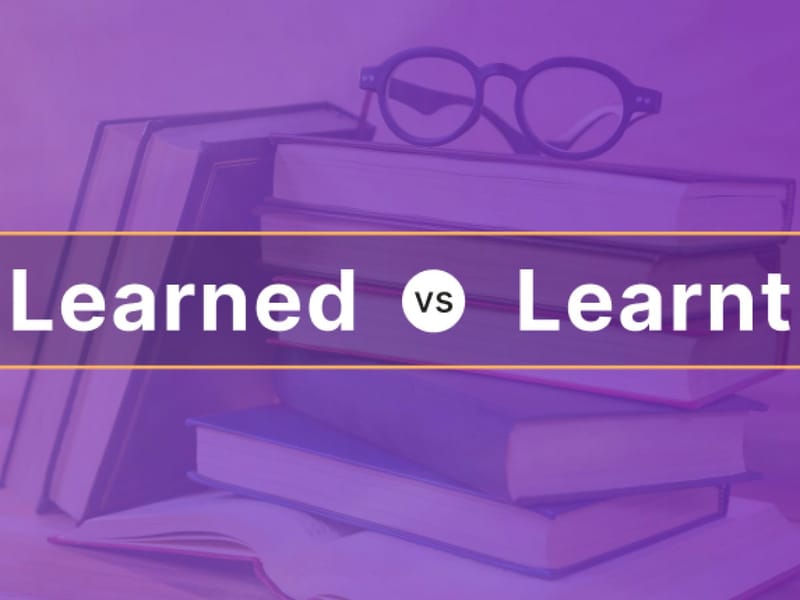The Tale of Two Spellings: 'Learned' vs 'Learnt'
Contents

Imagine this: You've finished a tough project at work and feel proud of what you've achieved. You want to tell your English-speaking colleague, "I learnt a lot from this project." But then you hesitate—should it be learned or learnt? Sound familiar? Figuring out words like these can be confusing, especially for non-native English speakers.
Understanding the difference between 'learned' and 'learnt' isn't just about grammar. It's about expressing yourself clearly, which matters in both personal and professional conversations. Making a small mistake, like using 'learned' instead of 'learnt', can make you feel uneasy and less sure.
In this article, we'll explore 'learned vs learnt' meanings in different situations and how to use them correctly. We'll use examples that Indian readers can relate to. Stick with us to clear up any confusion about these terms!
Understanding the Difference between Learned and Learnt
'Learned' and 'Learnt' are two words that seem to confuse many English learners. Both are past tense forms of the verb 'learn'. It means to acquire knowledge or skills in something through study, experience, or teaching.
The main difference between these two terms lies in their region-specific application. 'Learned', pronounced as /ləːnd/, is widely used in American English. While British English favours 'learnt', pronounced as /ləːnt/.
Learned | Learnt | |
Origin | Old English | Variant of Learned |
Usage | American English | British English |
When to Use 'Learned' vs 'Learnt'?
The context in which these spellings are used can vary. As previously mentioned, ‘learned’ is predominantly used in American English. For instance, “I have learned so much from this workshop.”
Meanwhile, ‘learnt’ finds is primarily used in British English. Example: “I’ve just learnt about the meeting tomorrow.”
Consider these contexts:
In an American workspace: "We have learned new strategies for customer engagement."
Chatting with a friend from UK: "Guess what? I've learnt how to cook biryani!"
Here's a quick guide:
Use ‘learned’: When writing for an American audience.
Use ‘learnt’: While communicating with British English speakers.
Want to explore other words that differ in UK and US English? Check out the Clapingo blogs on a few of them:
The Impact of Culture on Language Learning: An Indian Perspective
India's diverse cultural mix, including its many languages, shapes how we learn English. Our history of British colonialism also gave us a blend called Indian English, mixing British and American styles with local dialects. This mix creates unique phrases and expressions not found in 'standard' English. For example, in India, "pass out" means graduating, unlike its usual meaning.
Respectful communication is also vital in our culture, leading to polite phrases like 'Could you please...' or indirect speech, even when direct speech might work.
Understanding these cultural quirks and adjusting how you speak can boost your interpersonal skills, especially in global communications.
Common Mistakes with Learned and Learnt & How to Avoid Them

In India, due to our British colonial past, "learnt" is more commonly used than "learned." However, many learners aren't aware that both forms are correct but just used differently in British and American English.
Here are some common mistakes:
Using 'learnt' in written American English. While "learnt" is acceptable in spoken contexts or informal writing, stick to "learned" for formal American English writing.
Interchanging learnt/learned haphazardly. Consistency matters. If you're using British English rules in a document, stick to "learnt" in all the places.
To avoid these pitfalls:
Be aware of the intended audience and adjust your language usage accordingly.
Practice using both forms in sentences. For instance, "I learned (AmE) / learnt (BrE) how to bake a cake yesterday."
For more such common mistakes and their solutions, check out this helpful Clapingo video.
Role of Online Learning Platforms in Enhancing English Skills
In today's digital world, online platforms like Clapingo are a great help for people learning languages, especially in India. They provide a relaxed and flexible way to improve your English skills at your own speed. Whether you just want to improve your spoken English or you are preparing for the IELTS, Clapingo can help you.
One big advantage of these platforms is their personalized coaching sessions. Learning English isn't just about knowing more words or grammar. Understanding details like this is also important when you are crafting simple sentences. Like 'Ihave learned vs learnt a lot from my mentor.'
Clapingo plans sessions that focus on these small differences. Their English-speaking tutors can help you understand these details by explaining how they're used in real life.
This makes online platforms a great way to improve your English skills without giving up convenience or comfort.
Quick Recap
Let's quickly go over what we've talked about regarding the differences between 'learned' and 'learnt'. The big difference is where they're used. 'Learned' is more common in American English, while 'learnt' is used more in British English.
But neither is wrong! Both are right and understood everywhere. The trick is using the one that fits best the context/audience. These small differences in language can make you stand out as a skilled English speaker.
So, enjoy learning more about these interesting parts of English. Platforms like Clapingo can help non-native speakers get better at English at home. Remember, every lesson you learn is a step toward speaking English confidently.
FAQs
1. What is the difference between learned and learnt?
Both 'learned' and 'learnt' are used to describe the past tense of learning. However, the use of these words depends on the region. In British English, which is commonly used in India, 'learnt' is more popular. For instance, you might say "I learnt a new recipe today". On the other hand, 'learned' is preferred in American English. Either way, both learned vs learnt mean something that was understood or acquired.
2. Can I switch between using learned and learnt?
While consistency is important, switching between 'learned' and 'learnt' won't affect your communication. If you're writing for an international audience or speaking with Americans, using 'learned' might be more suitable. But for everyday conversations or professional communication in India, either can be used.
3. Are there other verbs like learn that follow this pattern?
Yes! Many verbs in English can have two forms for simple past tense and past participle—one ending with '-ed' and another ending with '-t'. Examples include spilled/spilt, dreamed/dreamt, burned/burnt, etc. The '-t' ending is more common in British English, while the '-ed' ending is favoured in American usage.
Comments
Your comment has been submitted